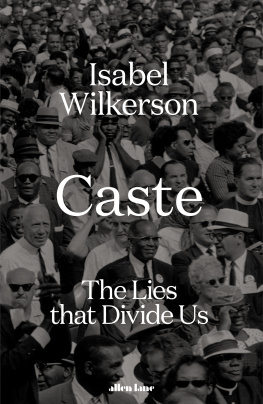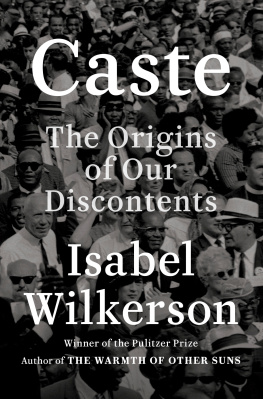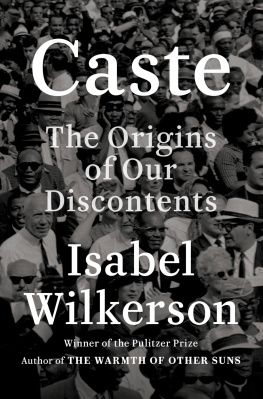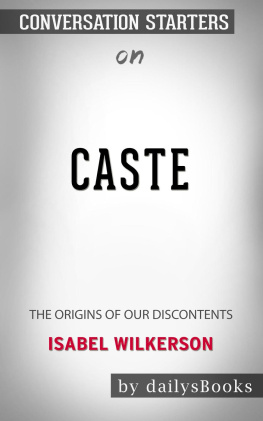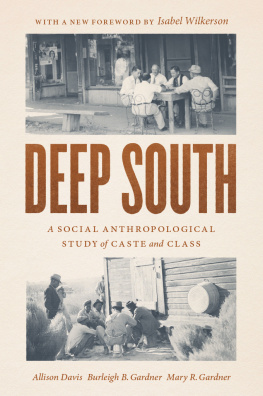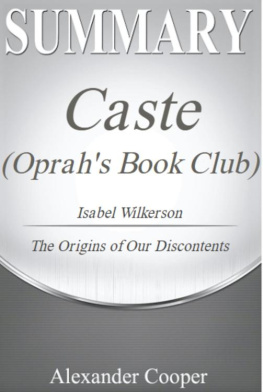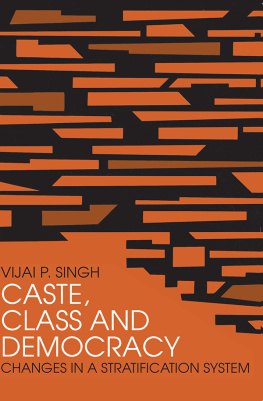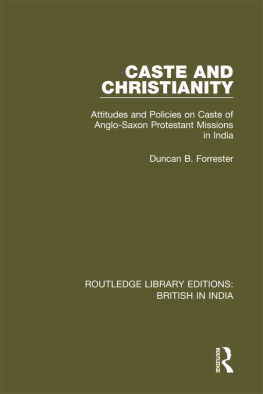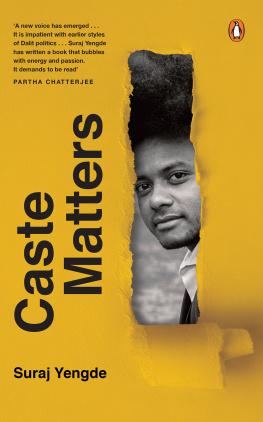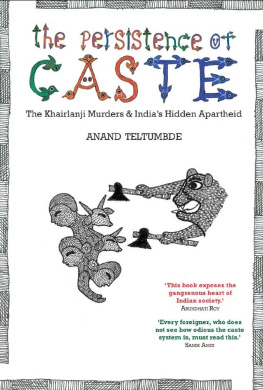

Isabel Wilkerson
Caste
The Lies That Divide Us

CONTENTS
ABOUT THE AUTHOR
Isabel Wilkerson, winner of the Pulitzer Prize and the National Humanities Medal, is the author of the critically acclaimed New York Times bestseller The Warmth of Other Suns. Her debut work won the National Book Critics Circle Award for Nonfiction and was included in Times 10 Best Nonfiction Books of the 2010s and in The New York Timess list of the Best Nonfiction of All Time. She has taught at Princeton, Emory, and Boston Universities and has lectured at more than two hundred other colleges and universities across the United States and in Europe and Asia.
BY THE SAME AUTHOR
The Warmth of Other Suns
To the memory of my parents who survived the caste system and to the memory of Brett who defied it
Because even if I should speak,
no one would believe me.
And they would not believe me precisely because
they would know that what I said was true.
J ames B aldwin
If the majority knew of the root of this evil,
then the road to its cure would not be long.
A lbert E instein
The Man in the Crowd
There is a famous black-and-white photograph from the era of the Third Reich. It is a picture taken in Hamburg, Germany, in 1936, of shipyard workers, a hundred or more, facing the same direction in the light of the sun. They are heiling in unison, their right arms rigid in outstretched allegiance to the Fhrer.
If you look closely, you can see a man in the upper right who is different from the others. His face is gentle but unyielding. Modern-day displays of the photograph will often add a helpful red circle around the man or an arrow pointing to him. He is surrounded by fellow citizens caught under the spell of the Nazis. He keeps his arms folded to his chest, as the stiff palms of the others hover just inches from him. He alone is refusing to salute. He is the one man standing against the tide.
Looking back from our vantage point, he is the only person in the entire scene who is on the right side of history. Everyone around him is tragically, fatefully, categorically wrong. In that moment, only he could see it.
His name is believed to have been August Landmesser. At the time, he could not have known the murderous path the hysteria around him would lead to. But he had already seen enough to reject it.
He had joined the Nazi Party himself years before. By now though, he knew firsthand that the Nazis were feeding Germans lies about Jews, the outcastes of his era, that, even this early in the Reich, the Nazis had caused terror, heartache, and disruption. He knew that Jews were anything but Untermenschen, that they were German citizens, human as anyone else. He was an Aryan in love with a Jewish woman, but the recently enacted Nuremberg Laws had made their relationship illegal. They were forbidden to marry or to have sexual relations, either of which amounted to what the Nazis called racial infamy.
His personal experience and close connection to the scapegoated caste allowed him to see past the lies and stereotypes so readily embraced by susceptible membersthe majority, sadlyof the dominant caste. Though Aryan himself, his openness to the humanity of the people who had been deemed beneath him gave him a stake in their well-being, their fates tied to his. He could see what his countrymen chose not to see.
In a totalitarian regime such as that of the Third Reich, it was an act of bravery to stand firm against an ocean. We would all want to believe that we would have been him. We might feel certain that, were we Aryan citizens under the Third Reich, we surely would have seen through it, would have risen above it like him, been that person resisting authoritarianism and brutality in the face of mass hysteria.
We would like to believe that we would have taken the more difficult path of standing up against injustice in defense of the outcaste. But unless people are willing to transcend their fears, endure discomfort and derision, suffer the scorn of loved ones and neighbors and co-workers and friends, fall into disfavor of perhaps everyone they know, face exclusion and even banishment, it would be numerically impossible, humanly impossible, for everyone to be that man. What would it take to be him in any era? What would it take to be him now?

Part One
Toxins in the Permafrost and Heat Rising All Around
CHAPTER ONE
The Afterlife of Pathogens
In the haunted summer of 2016, an unaccustomed heat wave struck the Siberian tundra on the edge of what the ancients once called the End of the Land. Above the Arctic Circle and far from the tectonic plates colliding in American politics, the heat rose beneath the earths surface and also bore down from above, the air reaching an inconceivable 95 degrees on the Russian peninsula of Yamal. Wildfires flared, and pockets of methane gurgled beneath the normally frozen soil in the polar region.
Soon, the children of the indigenous herdsmen fell sick from a mysterious illness that many people alive had never seen and did not recognize. A twelve-year-old boy developed a high fever and acute stomach pangs, and passed away. Russian authorities declared a state of emergency and began airlifting hundreds of the sickened herding people, the Nenets, to the nearest hospital in Salekhard.
Scientists then identified what had afflicted the Siberian settlements. The aberrant heat had chiseled far deeper into the Russian permafrost than was normal and had exposed a toxin that had been encased since 1941, when the world was last at war. It was the pathogen anthrax, which had killed herds of reindeer all those decades ago and lain hidden in the animal carcasses long since buried in the permafrost. A thawed and tainted carcass rose to the surface that summer, the pathogen awakened, intact and as powerful as it had ever been. The pathogen spores seeped into the grazing land and infected the reindeer and spread to the herders who raised and relied upon them. The anthrax, like the reactivation of the human pathogens of hatred and tribalism in this evolving century, had never died. It lay in wait, sleeping, until extreme circumstances brought it to the surface and back to life.
On the other side of the planet, the worlds oldest and most powerful democracy was in spasms over an election that would transfix the Western world and become a psychic break in American history, one that will likely be studied and dissected for generations. That summer and into the fall and in the ensuing years to come, amid talk of Muslim bans, nasty women, border walls, and shithole nations, it was common to hear in certain circles the disbelieving cries, This is not America, or I dont recognize my country, or This is not who we are. Except that this was and is our country and this was and is who we are, whether we have known or recognized it or not.
Next page
